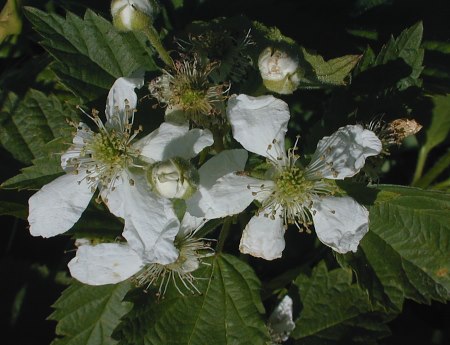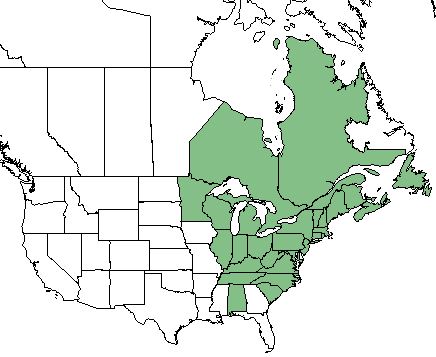Difference between revisions of "Rubus pensilvanicus"
| Line 1: | Line 1: | ||
{{italic title}} | {{italic title}} | ||
| + | Common name: Pennsylvania blackberry <ref name= "Weakley 2015"/>, eastern blackberry <ref name= "Weakley 2015"/> | ||
<!-- Get the taxonomy information from the NRCS Plants database --> | <!-- Get the taxonomy information from the NRCS Plants database --> | ||
{{taxobox | {{taxobox | ||
Revision as of 12:12, 12 June 2018
Common name: Pennsylvania blackberry [1], eastern blackberry [1]
| Rubus pensilvanicus | |
|---|---|

| |
| Photo by John Hilty hosted at IllinoisWildflowers.info | |
| Scientific classification | |
| Kingdom: | Plantae |
| Division: | Magnoliophyta - Flowering plants |
| Class: | Magnoliopsida - Dicots |
| Order: | Rosales |
| Family: | Rosaceae |
| Genus: | Rubus |
| Species: | R. pensilvanicus |
| Binomial name | |
| Rubus pensilvanicus Poir. | |

| |
| Natural range of Rubus pensilvanicus from USDA NRCS Plants Database. | |
Contents
Taxonomic Notes
Synonyms: R. argutus
Varieties: none
Description
R. pensilvanicus is a perennial subshrub of the Rosaceae family native to North America and Canada. [2]
Distribution
R. pensilvanicus is found in the eastern half of the United States from Minnesota to Maine, as well as the Ontario, Quebec, New Brunswick, Nova Scotia, and Newfoundland/Labrador regions of Canada. [2]
Ecology
Habitat
R. pensilvanicus proliferates in roadsides, thickets, and woodlands. [1]
Phenology
R. pensilvanicus flowers February-May. [3]
Conservation and Management
Cultivation and restoration
Photo Gallery
References and notes
- ↑ 1.0 1.1 1.2 Weakley, A. S. (2015). Flora of the Southern and Mid-Atlantic States. Chapel Hill, NC, University of North Carolina Herbarium.
- ↑ 2.0 2.1 USDA Plant Database https://plants.usda.gov/core/profile?symbol=RUPE3
- ↑ PanFlora Author: Gil Nelson URL: http://www.gilnelson.com/PanFlora/ Date Accessed: 5/29/18